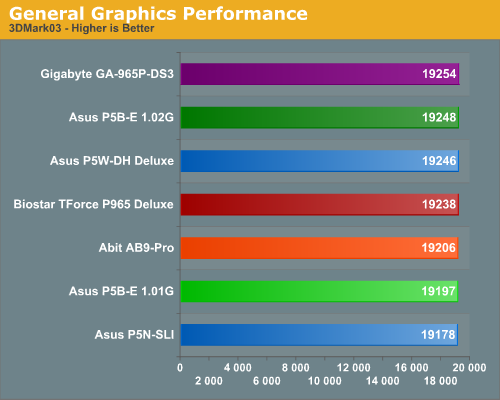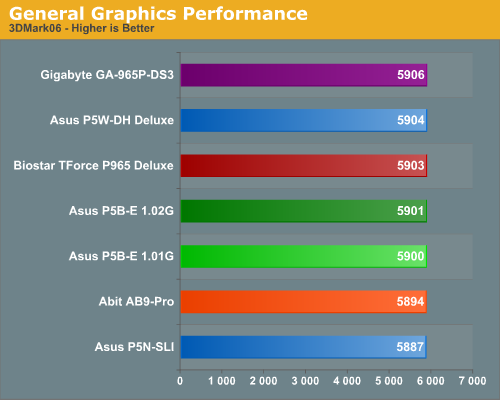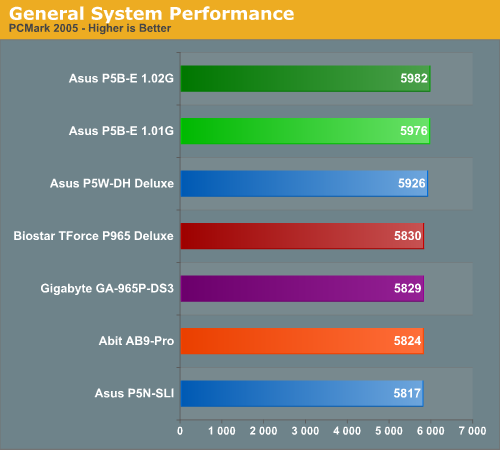Intel P965: Mid-Range Performance Sector Roundup
by Gary Key on October 20, 2006 9:00 PM EST- Posted in
- Motherboards
Synthetic Graphics Performance
The 3DMark series of benchmarks developed and provided by Futuremark are among the most widely used tools for benchmark reporting and comparisons. Although the benchmarks are very useful for providing apples to apples comparisons across a broad array of GPU and CPU configurations they are not a substitute for actual application and gaming benchmarks. In this sense we consider the 3DMark benchmarks to be purely synthetic in nature but still valuable for providing consistent measurements of performance.


General System Performance
In our first tests, each P965 platform score is so close that there is no real winner here. In the more memory and CPU sensitive 3DMark03 benchmark we see the same trend with the P965 boards scoring extremely close with the Gigabyte board leading in both benchmarks. We really did not expect to see any real differences but we do know the P965 is very competitive with the 975X in our synthetic benchmarks. Our only real disappointment is the performance of the ASUS P5NSLI board as generally the NVIDIA chipsets shine in the 3DMark scores. We attribute the scores to the fact that the board is based in the budget sector and is tuned for stability and overall system performance rather than games/graphics. As we recognized in our preview of this board, it was very sensitive to memory speed and timings with DDR2-800 being a minimum requirement before the board would perform well. We expect the upcoming 680i to change the results in this test.

Considering our 3DMark results we really did not expect a difference in this benchmark but we found one. The Intel based ASUS boards walked off and left the other boards in a cloud of dust. We typically find some variations in this benchmark due to Hard Disk performance with the NVIDIA chipsets consistently scoring about 9% better than the Intel chipsets. In this case the overall difference was around 4% in the HDD tests where the P965 based boards were performing better than the 975X board. Our 570SLI board did not score well in the multitasking tests where the ASUS P965 boards shined.
After reviewing the individual results we noticed all of the scores between the P965 boards were essentially the same until we reached the final test which consists of multitasking three different applications. The ASUS P965 boards and to some extent the 975X board scored up to 58% better in the File Encryption and HDD Virus section of the test. The File Compression number was around 16% better. We ended up running this particular test on each board several times with different memory and hard drive configurations with the same result. We continued to play detective and once all possible causes were researched we decided to create our own multitasking script to determine if ASUS had tuned their BIOS for this test or if they really had better multitasking performance. The results are on the next page.
The 3DMark series of benchmarks developed and provided by Futuremark are among the most widely used tools for benchmark reporting and comparisons. Although the benchmarks are very useful for providing apples to apples comparisons across a broad array of GPU and CPU configurations they are not a substitute for actual application and gaming benchmarks. In this sense we consider the 3DMark benchmarks to be purely synthetic in nature but still valuable for providing consistent measurements of performance.


General System Performance
In our first tests, each P965 platform score is so close that there is no real winner here. In the more memory and CPU sensitive 3DMark03 benchmark we see the same trend with the P965 boards scoring extremely close with the Gigabyte board leading in both benchmarks. We really did not expect to see any real differences but we do know the P965 is very competitive with the 975X in our synthetic benchmarks. Our only real disappointment is the performance of the ASUS P5NSLI board as generally the NVIDIA chipsets shine in the 3DMark scores. We attribute the scores to the fact that the board is based in the budget sector and is tuned for stability and overall system performance rather than games/graphics. As we recognized in our preview of this board, it was very sensitive to memory speed and timings with DDR2-800 being a minimum requirement before the board would perform well. We expect the upcoming 680i to change the results in this test.

Considering our 3DMark results we really did not expect a difference in this benchmark but we found one. The Intel based ASUS boards walked off and left the other boards in a cloud of dust. We typically find some variations in this benchmark due to Hard Disk performance with the NVIDIA chipsets consistently scoring about 9% better than the Intel chipsets. In this case the overall difference was around 4% in the HDD tests where the P965 based boards were performing better than the 975X board. Our 570SLI board did not score well in the multitasking tests where the ASUS P965 boards shined.
After reviewing the individual results we noticed all of the scores between the P965 boards were essentially the same until we reached the final test which consists of multitasking three different applications. The ASUS P965 boards and to some extent the 975X board scored up to 58% better in the File Encryption and HDD Virus section of the test. The File Compression number was around 16% better. We ended up running this particular test on each board several times with different memory and hard drive configurations with the same result. We continued to play detective and once all possible causes were researched we decided to create our own multitasking script to determine if ASUS had tuned their BIOS for this test or if they really had better multitasking performance. The results are on the next page.










62 Comments
View All Comments
JarredWalton - Friday, October 20, 2006 - link
I think that was a temporary glitch where the article went live before the last page's text was updated. Shame on you for skipping straight to the end.... ;)BadThad - Sunday, October 22, 2006 - link
Is the v1.02G Asus P5B-E using all solid capacitors? I read a press release stating that Asus was releasing the "P4B-E Plus" version with all solid caps. Rumor says the "Plus" version will not be sold in the USA.....arrgggggg. Tell me that's not true. I want the solid caps for long-term reliability. I'm wondering if our "Plus" is actually the v1.02G?